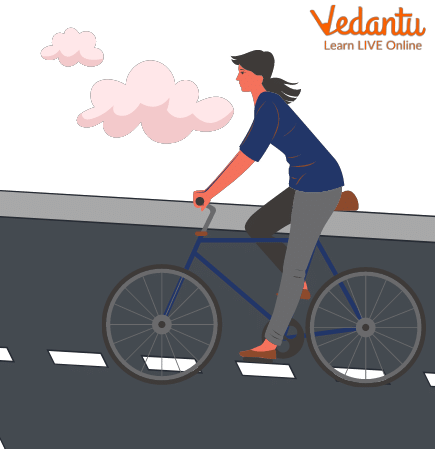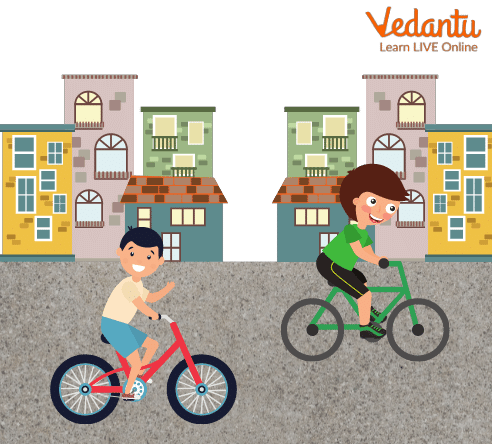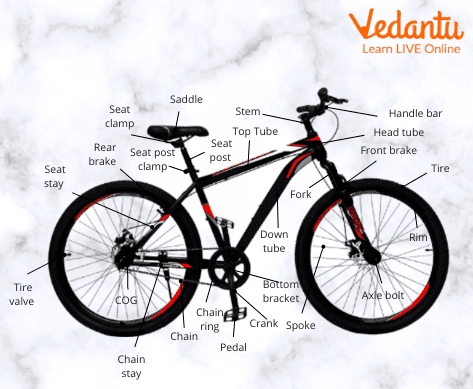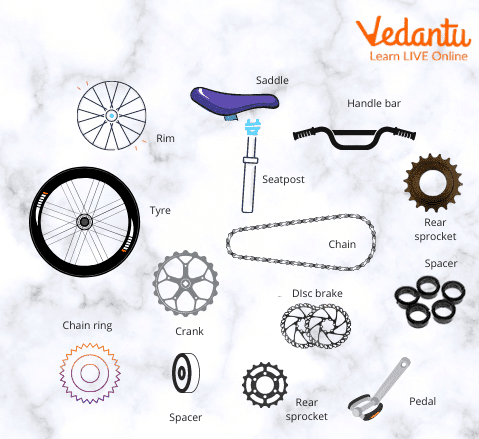




Step-by-Step Guide: Teaching Kids to Ride a Bicycle Safely
Have you ever ridden a bicycle? Riding a bicycle is great fun with friends and family. Riding a bicycle can be used for fun activities, exercise, play, and transportation. When and for what purpose do you use a bicycle? Share your experience with classmates and teachers.

Bicycle
A bicycle is a vehicle that allows you to travel from one location to another. The majority of bicycles have two wheels attached to a frame. The steering handlebars, a seat, and two pedals are all part of the frame. Bicycles are used by millions of people around the world for recreation, exercise, sport (cycling), and transportation.

Bicycle for kids
Invention of Bicycle
In the early 1800s, the first bicycle-like machines were invented. They didn't have any pedals. Later motorcycles had substantially larger front wheels and pedals than the back wheels. The front wheels stood roughly 5 feet tall (1.5 metres). Bicycles looked similar to what we see today around 1900.
Simple Parts of a Bicycle
The bicycle diagram is given below:

Bicycle Diagram
Simple parts of a bicycle present in the above-mentioned bicycle diagram too are:
Spoke
Handlebar
Bottom bracket
Spacer
Pedal
Saddle
Seat post
Rim
Tyre
Chain
Chain ring
Crank
Disc brake
Air chamber
Crank
Wheel hub
Rear sprocket

Basic Bicycle Parts
How Does a Bicycle Work?
The rider sits on the seat and sets his or her feet on the pedals to ride a bicycle. A chain connects the pedals to the back wheel. The back wheel turns as the rider pulls on the pedals. The bicycle will now travel forward. The rider steers by leaning or rotating the handlebars. This is how a bicycle works.
How Do Bicycle Brakes Work?
Two types of brakes are available on bicycles. Hand brakes or coaster brakes are available on bicycles. A rider on a bicycle with coaster brakes comes to a halt by pedalling backwards. The levers on the handlebars are used to control the hand brakes. When a rider squeezes the levers, pads press against the wheels, causing the bicycle to come to a complete stop.
Bicycles with gears, or speeds, are also available. When travelling on varied surfaces, shifting or changing gears allows the cyclist to maintain a consistent pedalling speed. Higher gears make pedalling more difficult, but they also allow the bicycle to travel quicker. When riding on smooth, flat ground, a rider can transfer the bicycle into a higher gear. Lower gears make cycling simpler, but they also cause the bicycle to slow down. When riding up a hill, a rider may shift to a lower gear.

World Bicycle Day
In April 2018, the United Nations general assembly declared June 3 as International World Bicycle Day. It is the only holiday as of now for celebrating the joys of cycling.
Summary
A bicycle, also known as a pedal cycle, bike, or cycle, is a single-track vehicle with two wheels coupled to a frame, one behind the other, that is powered by human or engine power. A cyclist, often known as a bicyclist, is a person who rides a bicycle.
Bicycles were first introduced in Europe in the 19th century. More than 1 billion people lived in the early twenty-first century. The advent of the bicycle had a huge impact on civilization, both in terms of culture and the advancement of contemporary industrial practices. World bicycle day is celebrated on June 3.
FAQs on Bicycle for Kids: Learn, Ride & Have Fun
1. What bicycle safety precautions are there?
Below stated are the significant safety measures
Put on a helmet.
On the road, keep to the right.
Ride only on paved, well-lit roads and, if practical, on bike paths.
Wear something reflective.
To indicate turns, use hand and arm gestures.
Ride in a group.
Make sure your bicycle is properly maintained.
2. What health advantages does cycling have?
The health benefits of regular cycling are as follows:
Improved cardiovascular health.
Enhanced flexibility and strength of the muscles.
Increased joint flexibility.
Reduced levels of stress.
Enhanced coordination and posture.
Increased bone density.
Reduced levels of body fat.
Illness control or prevention.
3. How many riders can ride side by side?
It is completely acceptable for cyclists to ride two abreast on the road, so feel free to do so while you are out for a spin with your buddies. However, the highway code prohibits riding more than two abreast, and it also forbids doing so on curvy or narrow routes.









